A Research Proposal: Impact of Language Games on Pupil Learning
VerifiedAdded on 2023/01/19
|14
|3919
|77
Report
AI Summary
This research proposal investigates the impact of language games on pupil learning and classroom interaction, employing a descriptive research design with both primary and secondary data collection methods. The primary data involves surveying 50 teachers globally via email questionnaires, while secondary data is gathered from books and journals. Data analysis utilizes percentage methods and statistical graphs. The study explores the role of language games in enhancing learning, classroom dynamics, and communication skills, referencing UNESCO for traditional techniques. It addresses research questions related to current education techniques, language game applications, and recommendations for improving language game usage. Ethical considerations, strengths, weaknesses, and suggestions for future research are also discussed, aiming to contribute to the enhancement of education systems worldwide through innovative learning processes.
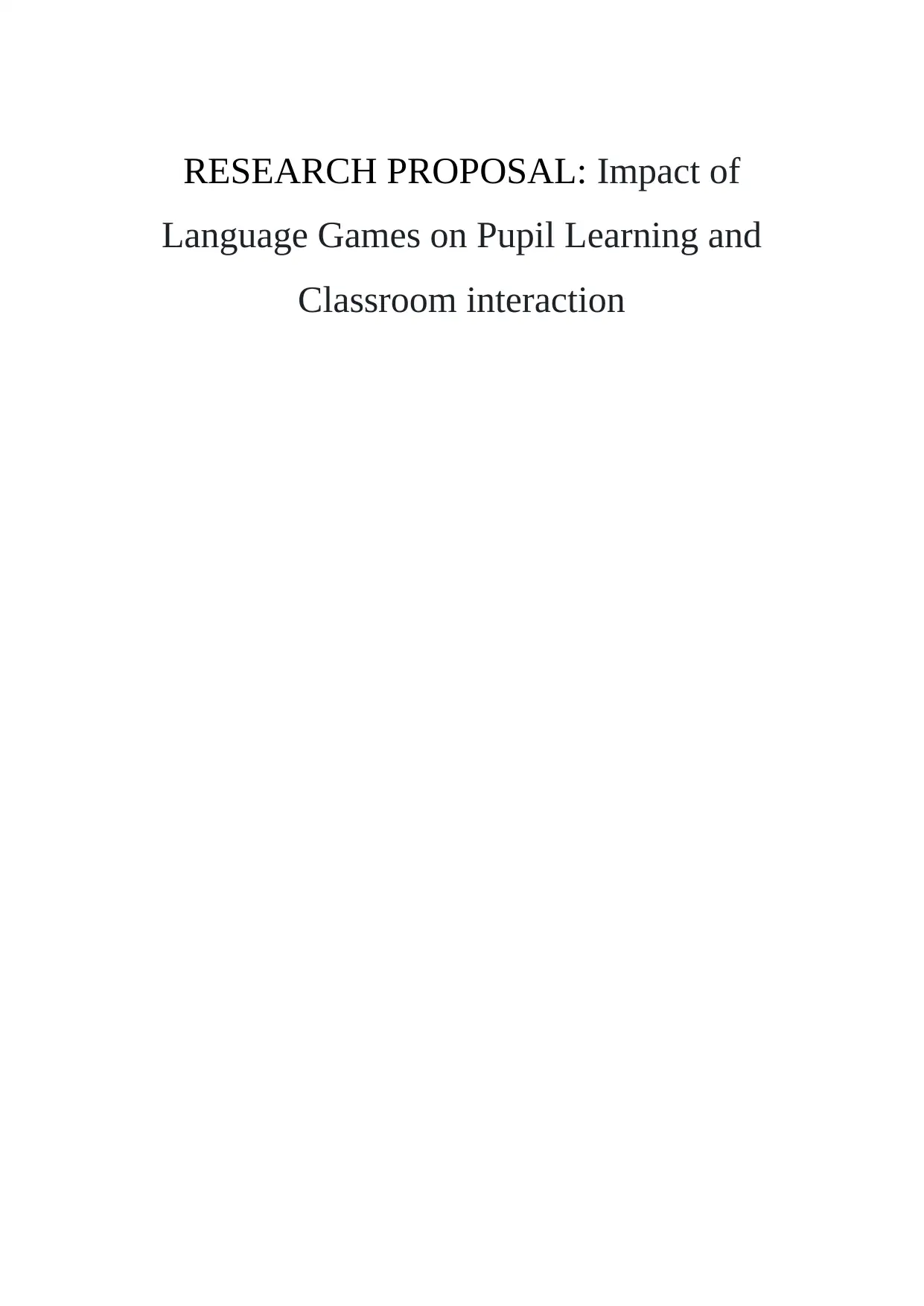
RESEARCH PROPOSAL: Impact of
Language Games on Pupil Learning and
Classroom interaction
Language Games on Pupil Learning and
Classroom interaction
Paraphrase This Document
Need a fresh take? Get an instant paraphrase of this document with our AI Paraphraser
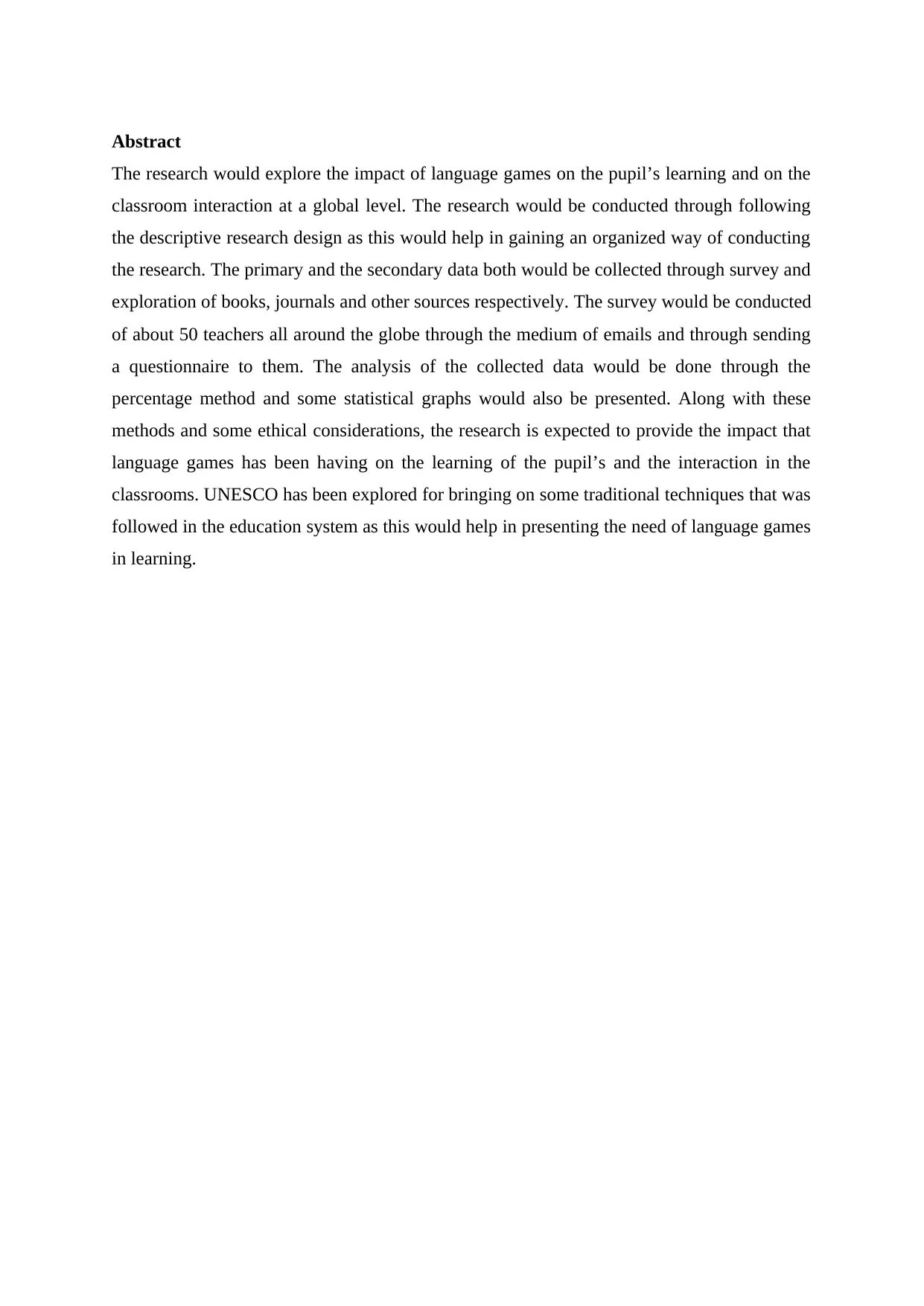
Abstract
The research would explore the impact of language games on the pupil’s learning and on the
classroom interaction at a global level. The research would be conducted through following
the descriptive research design as this would help in gaining an organized way of conducting
the research. The primary and the secondary data both would be collected through survey and
exploration of books, journals and other sources respectively. The survey would be conducted
of about 50 teachers all around the globe through the medium of emails and through sending
a questionnaire to them. The analysis of the collected data would be done through the
percentage method and some statistical graphs would also be presented. Along with these
methods and some ethical considerations, the research is expected to provide the impact that
language games has been having on the learning of the pupil’s and the interaction in the
classrooms. UNESCO has been explored for bringing on some traditional techniques that was
followed in the education system as this would help in presenting the need of language games
in learning.
The research would explore the impact of language games on the pupil’s learning and on the
classroom interaction at a global level. The research would be conducted through following
the descriptive research design as this would help in gaining an organized way of conducting
the research. The primary and the secondary data both would be collected through survey and
exploration of books, journals and other sources respectively. The survey would be conducted
of about 50 teachers all around the globe through the medium of emails and through sending
a questionnaire to them. The analysis of the collected data would be done through the
percentage method and some statistical graphs would also be presented. Along with these
methods and some ethical considerations, the research is expected to provide the impact that
language games has been having on the learning of the pupil’s and the interaction in the
classrooms. UNESCO has been explored for bringing on some traditional techniques that was
followed in the education system as this would help in presenting the need of language games
in learning.
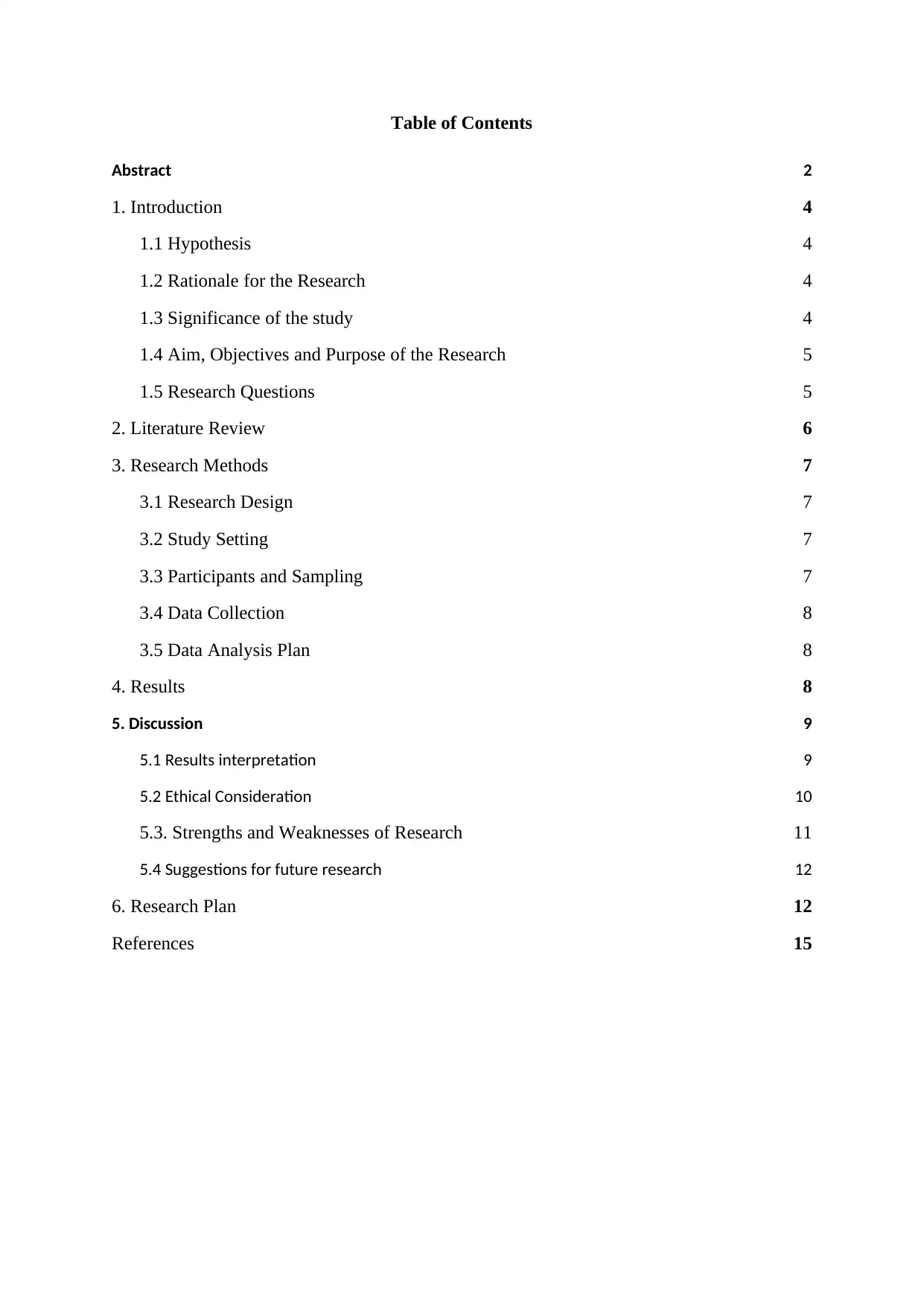
Table of Contents
Abstract 2
1. Introduction 4
1.1 Hypothesis 4
1.2 Rationale for the Research 4
1.3 Significance of the study 4
1.4 Aim, Objectives and Purpose of the Research 5
1.5 Research Questions 5
2. Literature Review 6
3. Research Methods 7
3.1 Research Design 7
3.2 Study Setting 7
3.3 Participants and Sampling 7
3.4 Data Collection 8
3.5 Data Analysis Plan 8
4. Results 8
5. Discussion 9
5.1 Results interpretation 9
5.2 Ethical Consideration 10
5.3. Strengths and Weaknesses of Research 11
5.4 Suggestions for future research 12
6. Research Plan 12
References 15
Abstract 2
1. Introduction 4
1.1 Hypothesis 4
1.2 Rationale for the Research 4
1.3 Significance of the study 4
1.4 Aim, Objectives and Purpose of the Research 5
1.5 Research Questions 5
2. Literature Review 6
3. Research Methods 7
3.1 Research Design 7
3.2 Study Setting 7
3.3 Participants and Sampling 7
3.4 Data Collection 8
3.5 Data Analysis Plan 8
4. Results 8
5. Discussion 9
5.1 Results interpretation 9
5.2 Ethical Consideration 10
5.3. Strengths and Weaknesses of Research 11
5.4 Suggestions for future research 12
6. Research Plan 12
References 15
⊘ This is a preview!⊘
Do you want full access?
Subscribe today to unlock all pages.

Trusted by 1+ million students worldwide

1. Introduction
1.1 Hypothesis
Language Games has been one of the most interactive and conversational discussions and the
reason behind this has been the presence of variable languages and diversity of language
present around the globe (Allsop and Jessel, 2015). English being one of the languages
which has been adopted all over the globe, as the international language and teaching English
as a second or foreign language to the youngsters has brought in the need to take the
concerned research. The acceptance of English language as an international one has added on
to the importance and to the reason for including it in the primary curriculum in many of the
countries (Scholz and Schulze, 2017). The language games has been impacting the pupil’s
learning and the classroom interaction as the languages used as second language in the
countries education system impacts the psychology of the teachers and of the students which
has a repercussion impact on the students learning capabilities and teachers interacting
capabilities (El-Omari, 2016). The second language used in the countries creates a distinction
between the national language and the foreign language which built a gap between the
teachers and the students. This needs to be explored through the concerned research
(Chiaráinand Chasaide, 2016).
1.2 Rationale for the Research
The exploration of the language games has revealed that it has been playing an important role
in the learning processes of the education system and this has been directly linked to the
classroom interactions and the coming up generations. The learning ability of the people has
been impacted through the choice of language games and thus, tis brought in the need to
explore the impact of language games on the pupil learnings and the classroom interactions.
These factor has been playing an important role in building up the entire education system of
the country as well as the world when considered as a whole. The research would explore
every impacting factor on the pupil learning and the classroom interactions. This new
language of interaction and learning is the rationale of the research (El-Omari, 2016).
1.3 Significance of the study
As the research would explore the language games and the way it has been impacting the
pupils learning and the interaction in the classrooms, this would help in knowing the way and
the techniques which could be implied for enhancing the language games which would
channelize the learning process of the pupil and the classroom interactions would also be
1.1 Hypothesis
Language Games has been one of the most interactive and conversational discussions and the
reason behind this has been the presence of variable languages and diversity of language
present around the globe (Allsop and Jessel, 2015). English being one of the languages
which has been adopted all over the globe, as the international language and teaching English
as a second or foreign language to the youngsters has brought in the need to take the
concerned research. The acceptance of English language as an international one has added on
to the importance and to the reason for including it in the primary curriculum in many of the
countries (Scholz and Schulze, 2017). The language games has been impacting the pupil’s
learning and the classroom interaction as the languages used as second language in the
countries education system impacts the psychology of the teachers and of the students which
has a repercussion impact on the students learning capabilities and teachers interacting
capabilities (El-Omari, 2016). The second language used in the countries creates a distinction
between the national language and the foreign language which built a gap between the
teachers and the students. This needs to be explored through the concerned research
(Chiaráinand Chasaide, 2016).
1.2 Rationale for the Research
The exploration of the language games has revealed that it has been playing an important role
in the learning processes of the education system and this has been directly linked to the
classroom interactions and the coming up generations. The learning ability of the people has
been impacted through the choice of language games and thus, tis brought in the need to
explore the impact of language games on the pupil learnings and the classroom interactions.
These factor has been playing an important role in building up the entire education system of
the country as well as the world when considered as a whole. The research would explore
every impacting factor on the pupil learning and the classroom interactions. This new
language of interaction and learning is the rationale of the research (El-Omari, 2016).
1.3 Significance of the study
As the research would explore the language games and the way it has been impacting the
pupils learning and the interaction in the classrooms, this would help in knowing the way and
the techniques which could be implied for enhancing the language games which would
channelize the learning process of the pupil and the classroom interactions would also be
Paraphrase This Document
Need a fresh take? Get an instant paraphrase of this document with our AI Paraphraser
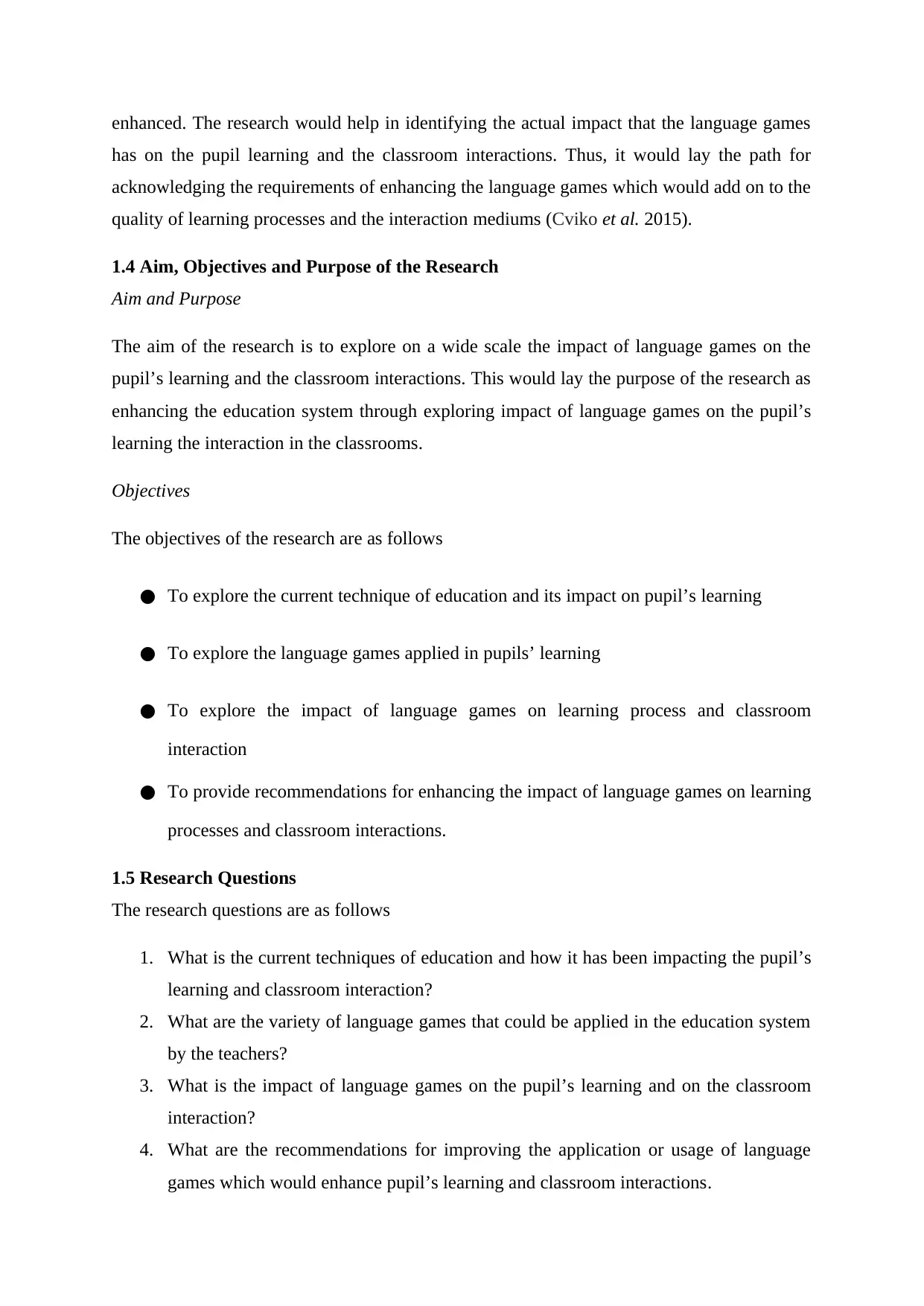
enhanced. The research would help in identifying the actual impact that the language games
has on the pupil learning and the classroom interactions. Thus, it would lay the path for
acknowledging the requirements of enhancing the language games which would add on to the
quality of learning processes and the interaction mediums (Cviko et al. 2015).
1.4 Aim, Objectives and Purpose of the Research
Aim and Purpose
The aim of the research is to explore on a wide scale the impact of language games on the
pupil’s learning and the classroom interactions. This would lay the purpose of the research as
enhancing the education system through exploring impact of language games on the pupil’s
learning the interaction in the classrooms.
Objectives
The objectives of the research are as follows
● To explore the current technique of education and its impact on pupil’s learning
● To explore the language games applied in pupils’ learning
● To explore the impact of language games on learning process and classroom
interaction
● To provide recommendations for enhancing the impact of language games on learning
processes and classroom interactions.
1.5 Research Questions
The research questions are as follows
1. What is the current techniques of education and how it has been impacting the pupil’s
learning and classroom interaction?
2. What are the variety of language games that could be applied in the education system
by the teachers?
3. What is the impact of language games on the pupil’s learning and on the classroom
interaction?
4. What are the recommendations for improving the application or usage of language
games which would enhance pupil’s learning and classroom interactions.
has on the pupil learning and the classroom interactions. Thus, it would lay the path for
acknowledging the requirements of enhancing the language games which would add on to the
quality of learning processes and the interaction mediums (Cviko et al. 2015).
1.4 Aim, Objectives and Purpose of the Research
Aim and Purpose
The aim of the research is to explore on a wide scale the impact of language games on the
pupil’s learning and the classroom interactions. This would lay the purpose of the research as
enhancing the education system through exploring impact of language games on the pupil’s
learning the interaction in the classrooms.
Objectives
The objectives of the research are as follows
● To explore the current technique of education and its impact on pupil’s learning
● To explore the language games applied in pupils’ learning
● To explore the impact of language games on learning process and classroom
interaction
● To provide recommendations for enhancing the impact of language games on learning
processes and classroom interactions.
1.5 Research Questions
The research questions are as follows
1. What is the current techniques of education and how it has been impacting the pupil’s
learning and classroom interaction?
2. What are the variety of language games that could be applied in the education system
by the teachers?
3. What is the impact of language games on the pupil’s learning and on the classroom
interaction?
4. What are the recommendations for improving the application or usage of language
games which would enhance pupil’s learning and classroom interactions.
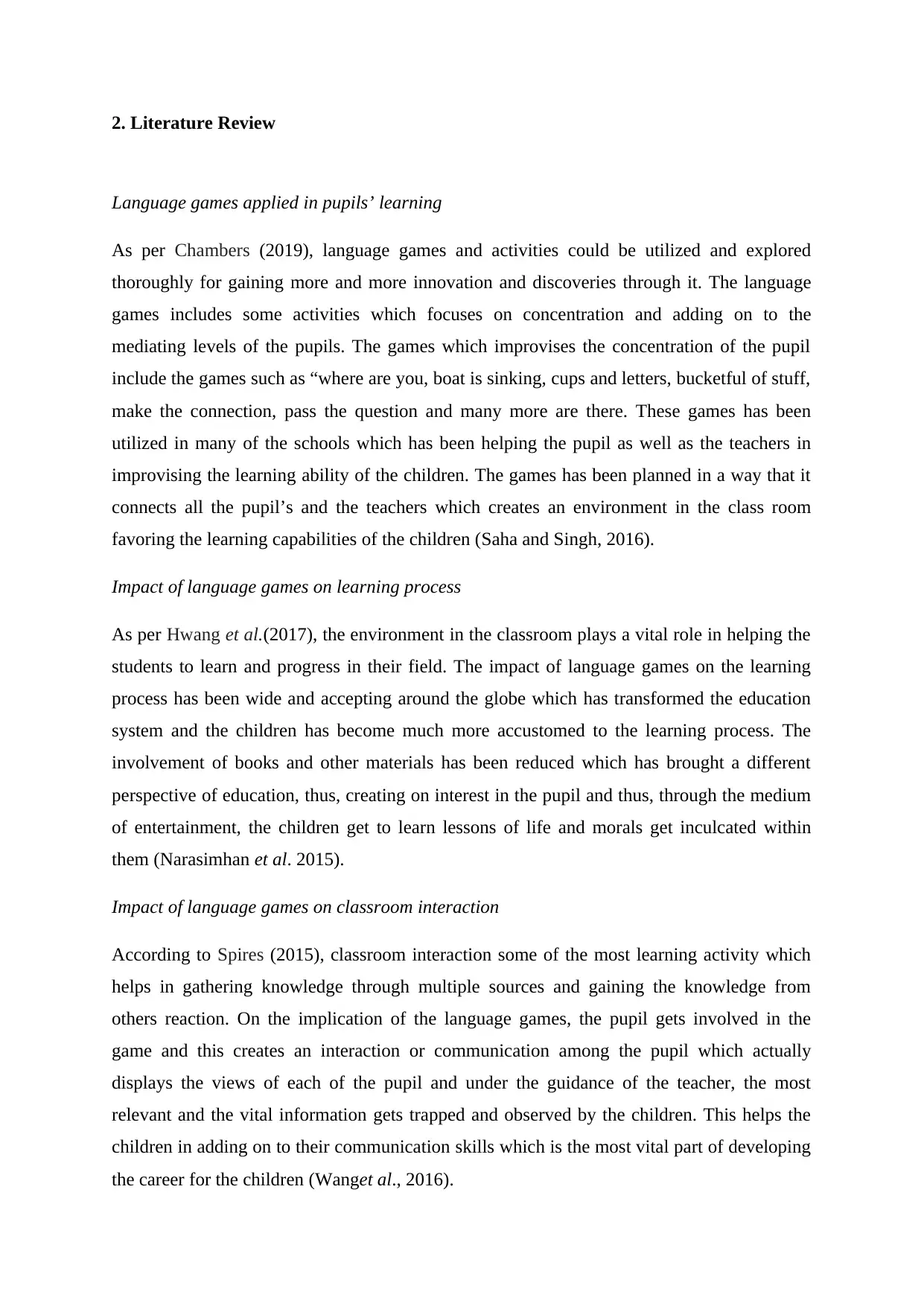
2. Literature Review
Language games applied in pupils’ learning
As per Chambers (2019), language games and activities could be utilized and explored
thoroughly for gaining more and more innovation and discoveries through it. The language
games includes some activities which focuses on concentration and adding on to the
mediating levels of the pupils. The games which improvises the concentration of the pupil
include the games such as “where are you, boat is sinking, cups and letters, bucketful of stuff,
make the connection, pass the question and many more are there. These games has been
utilized in many of the schools which has been helping the pupil as well as the teachers in
improvising the learning ability of the children. The games has been planned in a way that it
connects all the pupil’s and the teachers which creates an environment in the class room
favoring the learning capabilities of the children (Saha and Singh, 2016).
Impact of language games on learning process
As per Hwang et al.(2017), the environment in the classroom plays a vital role in helping the
students to learn and progress in their field. The impact of language games on the learning
process has been wide and accepting around the globe which has transformed the education
system and the children has become much more accustomed to the learning process. The
involvement of books and other materials has been reduced which has brought a different
perspective of education, thus, creating on interest in the pupil and thus, through the medium
of entertainment, the children get to learn lessons of life and morals get inculcated within
them (Narasimhan et al. 2015).
Impact of language games on classroom interaction
According to Spires (2015), classroom interaction some of the most learning activity which
helps in gathering knowledge through multiple sources and gaining the knowledge from
others reaction. On the implication of the language games, the pupil gets involved in the
game and this creates an interaction or communication among the pupil which actually
displays the views of each of the pupil and under the guidance of the teacher, the most
relevant and the vital information gets trapped and observed by the children. This helps the
children in adding on to their communication skills which is the most vital part of developing
the career for the children (Wanget al., 2016).
Language games applied in pupils’ learning
As per Chambers (2019), language games and activities could be utilized and explored
thoroughly for gaining more and more innovation and discoveries through it. The language
games includes some activities which focuses on concentration and adding on to the
mediating levels of the pupils. The games which improvises the concentration of the pupil
include the games such as “where are you, boat is sinking, cups and letters, bucketful of stuff,
make the connection, pass the question and many more are there. These games has been
utilized in many of the schools which has been helping the pupil as well as the teachers in
improvising the learning ability of the children. The games has been planned in a way that it
connects all the pupil’s and the teachers which creates an environment in the class room
favoring the learning capabilities of the children (Saha and Singh, 2016).
Impact of language games on learning process
As per Hwang et al.(2017), the environment in the classroom plays a vital role in helping the
students to learn and progress in their field. The impact of language games on the learning
process has been wide and accepting around the globe which has transformed the education
system and the children has become much more accustomed to the learning process. The
involvement of books and other materials has been reduced which has brought a different
perspective of education, thus, creating on interest in the pupil and thus, through the medium
of entertainment, the children get to learn lessons of life and morals get inculcated within
them (Narasimhan et al. 2015).
Impact of language games on classroom interaction
According to Spires (2015), classroom interaction some of the most learning activity which
helps in gathering knowledge through multiple sources and gaining the knowledge from
others reaction. On the implication of the language games, the pupil gets involved in the
game and this creates an interaction or communication among the pupil which actually
displays the views of each of the pupil and under the guidance of the teacher, the most
relevant and the vital information gets trapped and observed by the children. This helps the
children in adding on to their communication skills which is the most vital part of developing
the career for the children (Wanget al., 2016).
⊘ This is a preview!⊘
Do you want full access?
Subscribe today to unlock all pages.

Trusted by 1+ million students worldwide
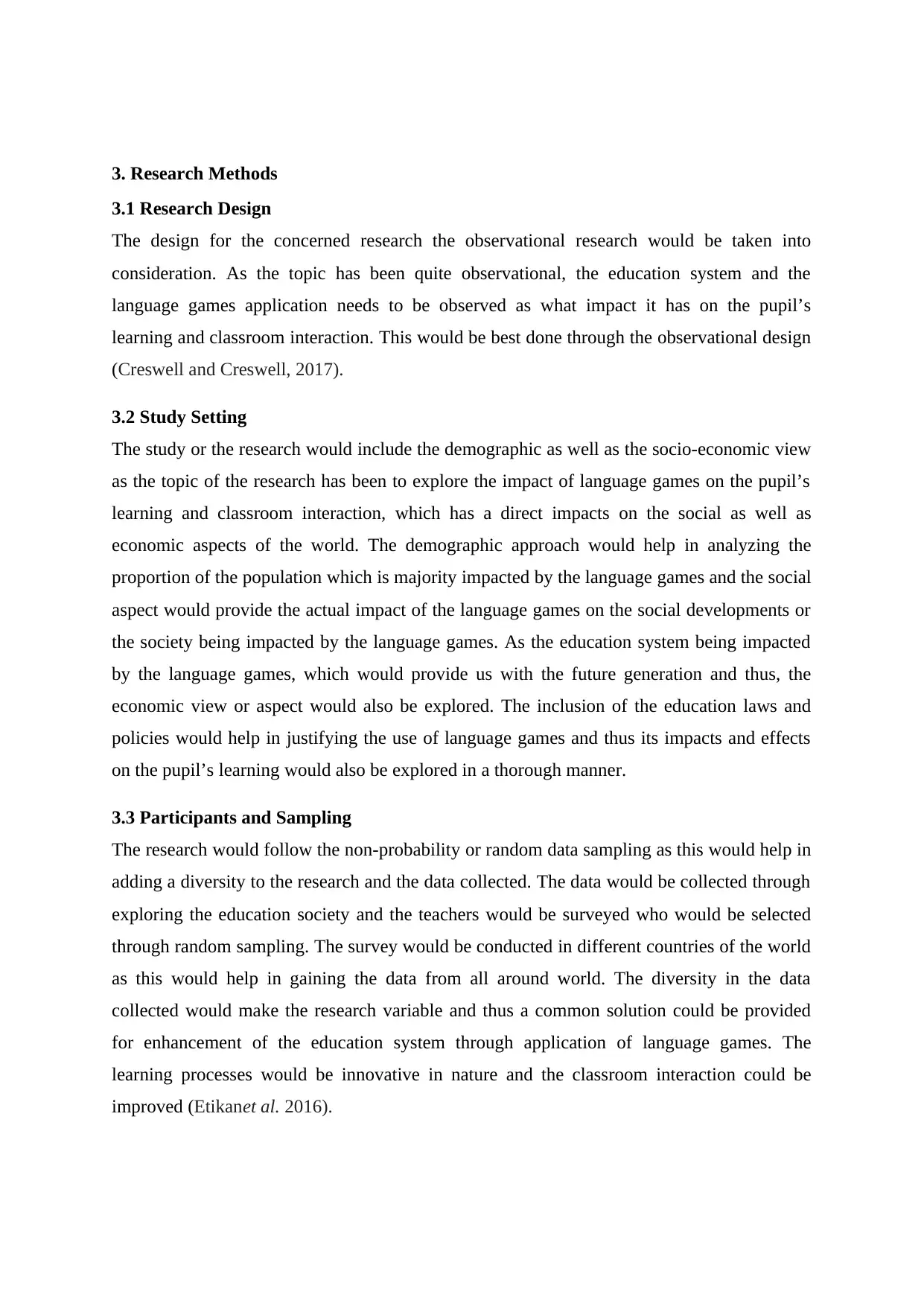
3. Research Methods
3.1 Research Design
The design for the concerned research the observational research would be taken into
consideration. As the topic has been quite observational, the education system and the
language games application needs to be observed as what impact it has on the pupil’s
learning and classroom interaction. This would be best done through the observational design
(Creswell and Creswell, 2017).
3.2 Study Setting
The study or the research would include the demographic as well as the socio-economic view
as the topic of the research has been to explore the impact of language games on the pupil’s
learning and classroom interaction, which has a direct impacts on the social as well as
economic aspects of the world. The demographic approach would help in analyzing the
proportion of the population which is majority impacted by the language games and the social
aspect would provide the actual impact of the language games on the social developments or
the society being impacted by the language games. As the education system being impacted
by the language games, which would provide us with the future generation and thus, the
economic view or aspect would also be explored. The inclusion of the education laws and
policies would help in justifying the use of language games and thus its impacts and effects
on the pupil’s learning would also be explored in a thorough manner.
3.3 Participants and Sampling
The research would follow the non-probability or random data sampling as this would help in
adding a diversity to the research and the data collected. The data would be collected through
exploring the education society and the teachers would be surveyed who would be selected
through random sampling. The survey would be conducted in different countries of the world
as this would help in gaining the data from all around world. The diversity in the data
collected would make the research variable and thus a common solution could be provided
for enhancement of the education system through application of language games. The
learning processes would be innovative in nature and the classroom interaction could be
improved (Etikanet al. 2016).
3.1 Research Design
The design for the concerned research the observational research would be taken into
consideration. As the topic has been quite observational, the education system and the
language games application needs to be observed as what impact it has on the pupil’s
learning and classroom interaction. This would be best done through the observational design
(Creswell and Creswell, 2017).
3.2 Study Setting
The study or the research would include the demographic as well as the socio-economic view
as the topic of the research has been to explore the impact of language games on the pupil’s
learning and classroom interaction, which has a direct impacts on the social as well as
economic aspects of the world. The demographic approach would help in analyzing the
proportion of the population which is majority impacted by the language games and the social
aspect would provide the actual impact of the language games on the social developments or
the society being impacted by the language games. As the education system being impacted
by the language games, which would provide us with the future generation and thus, the
economic view or aspect would also be explored. The inclusion of the education laws and
policies would help in justifying the use of language games and thus its impacts and effects
on the pupil’s learning would also be explored in a thorough manner.
3.3 Participants and Sampling
The research would follow the non-probability or random data sampling as this would help in
adding a diversity to the research and the data collected. The data would be collected through
exploring the education society and the teachers would be surveyed who would be selected
through random sampling. The survey would be conducted in different countries of the world
as this would help in gaining the data from all around world. The diversity in the data
collected would make the research variable and thus a common solution could be provided
for enhancement of the education system through application of language games. The
learning processes would be innovative in nature and the classroom interaction could be
improved (Etikanet al. 2016).
Paraphrase This Document
Need a fresh take? Get an instant paraphrase of this document with our AI Paraphraser
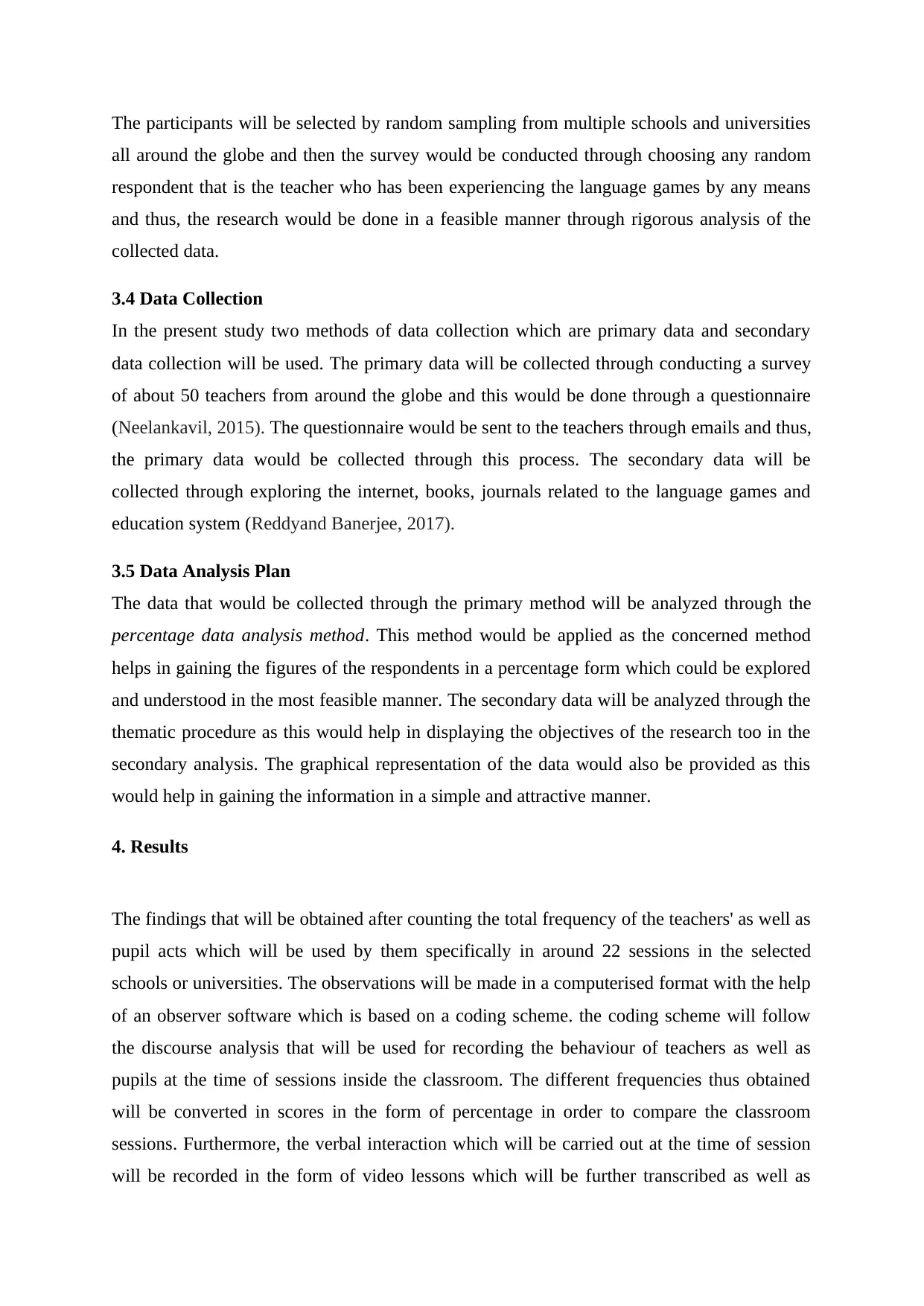
The participants will be selected by random sampling from multiple schools and universities
all around the globe and then the survey would be conducted through choosing any random
respondent that is the teacher who has been experiencing the language games by any means
and thus, the research would be done in a feasible manner through rigorous analysis of the
collected data.
3.4 Data Collection
In the present study two methods of data collection which are primary data and secondary
data collection will be used. The primary data will be collected through conducting a survey
of about 50 teachers from around the globe and this would be done through a questionnaire
(Neelankavil, 2015). The questionnaire would be sent to the teachers through emails and thus,
the primary data would be collected through this process. The secondary data will be
collected through exploring the internet, books, journals related to the language games and
education system (Reddyand Banerjee, 2017).
3.5 Data Analysis Plan
The data that would be collected through the primary method will be analyzed through the
percentage data analysis method. This method would be applied as the concerned method
helps in gaining the figures of the respondents in a percentage form which could be explored
and understood in the most feasible manner. The secondary data will be analyzed through the
thematic procedure as this would help in displaying the objectives of the research too in the
secondary analysis. The graphical representation of the data would also be provided as this
would help in gaining the information in a simple and attractive manner.
4. Results
The findings that will be obtained after counting the total frequency of the teachers' as well as
pupil acts which will be used by them specifically in around 22 sessions in the selected
schools or universities. The observations will be made in a computerised format with the help
of an observer software which is based on a coding scheme. the coding scheme will follow
the discourse analysis that will be used for recording the behaviour of teachers as well as
pupils at the time of sessions inside the classroom. The different frequencies thus obtained
will be converted in scores in the form of percentage in order to compare the classroom
sessions. Furthermore, the verbal interaction which will be carried out at the time of session
will be recorded in the form of video lessons which will be further transcribed as well as
all around the globe and then the survey would be conducted through choosing any random
respondent that is the teacher who has been experiencing the language games by any means
and thus, the research would be done in a feasible manner through rigorous analysis of the
collected data.
3.4 Data Collection
In the present study two methods of data collection which are primary data and secondary
data collection will be used. The primary data will be collected through conducting a survey
of about 50 teachers from around the globe and this would be done through a questionnaire
(Neelankavil, 2015). The questionnaire would be sent to the teachers through emails and thus,
the primary data would be collected through this process. The secondary data will be
collected through exploring the internet, books, journals related to the language games and
education system (Reddyand Banerjee, 2017).
3.5 Data Analysis Plan
The data that would be collected through the primary method will be analyzed through the
percentage data analysis method. This method would be applied as the concerned method
helps in gaining the figures of the respondents in a percentage form which could be explored
and understood in the most feasible manner. The secondary data will be analyzed through the
thematic procedure as this would help in displaying the objectives of the research too in the
secondary analysis. The graphical representation of the data would also be provided as this
would help in gaining the information in a simple and attractive manner.
4. Results
The findings that will be obtained after counting the total frequency of the teachers' as well as
pupil acts which will be used by them specifically in around 22 sessions in the selected
schools or universities. The observations will be made in a computerised format with the help
of an observer software which is based on a coding scheme. the coding scheme will follow
the discourse analysis that will be used for recording the behaviour of teachers as well as
pupils at the time of sessions inside the classroom. The different frequencies thus obtained
will be converted in scores in the form of percentage in order to compare the classroom
sessions. Furthermore, the verbal interaction which will be carried out at the time of session
will be recorded in the form of video lessons which will be further transcribed as well as
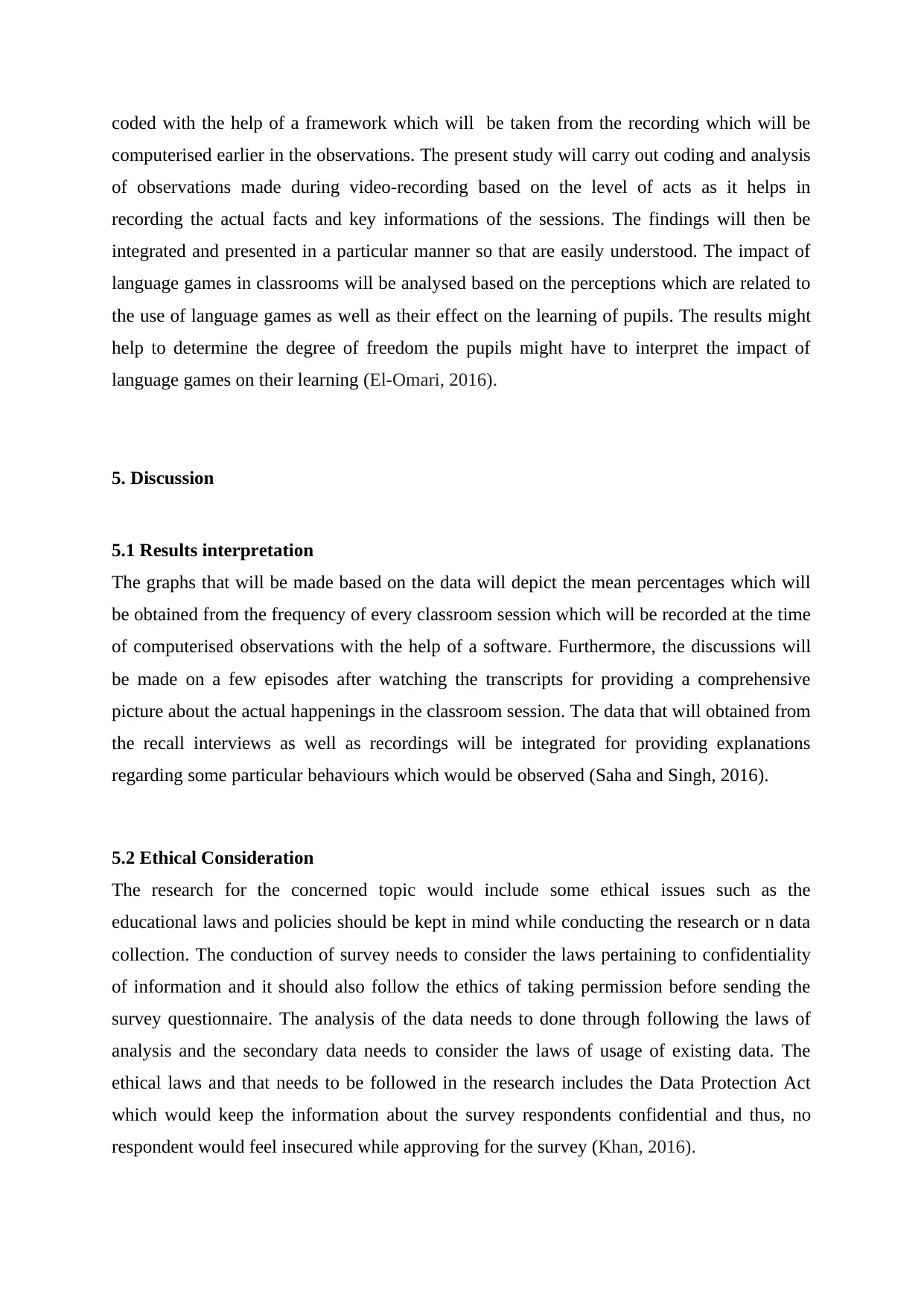
coded with the help of a framework which will be taken from the recording which will be
computerised earlier in the observations. The present study will carry out coding and analysis
of observations made during video-recording based on the level of acts as it helps in
recording the actual facts and key informations of the sessions. The findings will then be
integrated and presented in a particular manner so that are easily understood. The impact of
language games in classrooms will be analysed based on the perceptions which are related to
the use of language games as well as their effect on the learning of pupils. The results might
help to determine the degree of freedom the pupils might have to interpret the impact of
language games on their learning (El-Omari, 2016).
5. Discussion
5.1 Results interpretation
The graphs that will be made based on the data will depict the mean percentages which will
be obtained from the frequency of every classroom session which will be recorded at the time
of computerised observations with the help of a software. Furthermore, the discussions will
be made on a few episodes after watching the transcripts for providing a comprehensive
picture about the actual happenings in the classroom session. The data that will obtained from
the recall interviews as well as recordings will be integrated for providing explanations
regarding some particular behaviours which would be observed (Saha and Singh, 2016).
5.2 Ethical Consideration
The research for the concerned topic would include some ethical issues such as the
educational laws and policies should be kept in mind while conducting the research or n data
collection. The conduction of survey needs to consider the laws pertaining to confidentiality
of information and it should also follow the ethics of taking permission before sending the
survey questionnaire. The analysis of the data needs to done through following the laws of
analysis and the secondary data needs to consider the laws of usage of existing data. The
ethical laws and that needs to be followed in the research includes the Data Protection Act
which would keep the information about the survey respondents confidential and thus, no
respondent would feel insecured while approving for the survey (Khan, 2016).
computerised earlier in the observations. The present study will carry out coding and analysis
of observations made during video-recording based on the level of acts as it helps in
recording the actual facts and key informations of the sessions. The findings will then be
integrated and presented in a particular manner so that are easily understood. The impact of
language games in classrooms will be analysed based on the perceptions which are related to
the use of language games as well as their effect on the learning of pupils. The results might
help to determine the degree of freedom the pupils might have to interpret the impact of
language games on their learning (El-Omari, 2016).
5. Discussion
5.1 Results interpretation
The graphs that will be made based on the data will depict the mean percentages which will
be obtained from the frequency of every classroom session which will be recorded at the time
of computerised observations with the help of a software. Furthermore, the discussions will
be made on a few episodes after watching the transcripts for providing a comprehensive
picture about the actual happenings in the classroom session. The data that will obtained from
the recall interviews as well as recordings will be integrated for providing explanations
regarding some particular behaviours which would be observed (Saha and Singh, 2016).
5.2 Ethical Consideration
The research for the concerned topic would include some ethical issues such as the
educational laws and policies should be kept in mind while conducting the research or n data
collection. The conduction of survey needs to consider the laws pertaining to confidentiality
of information and it should also follow the ethics of taking permission before sending the
survey questionnaire. The analysis of the data needs to done through following the laws of
analysis and the secondary data needs to consider the laws of usage of existing data. The
ethical laws and that needs to be followed in the research includes the Data Protection Act
which would keep the information about the survey respondents confidential and thus, no
respondent would feel insecured while approving for the survey (Khan, 2016).
⊘ This is a preview!⊘
Do you want full access?
Subscribe today to unlock all pages.

Trusted by 1+ million students worldwide
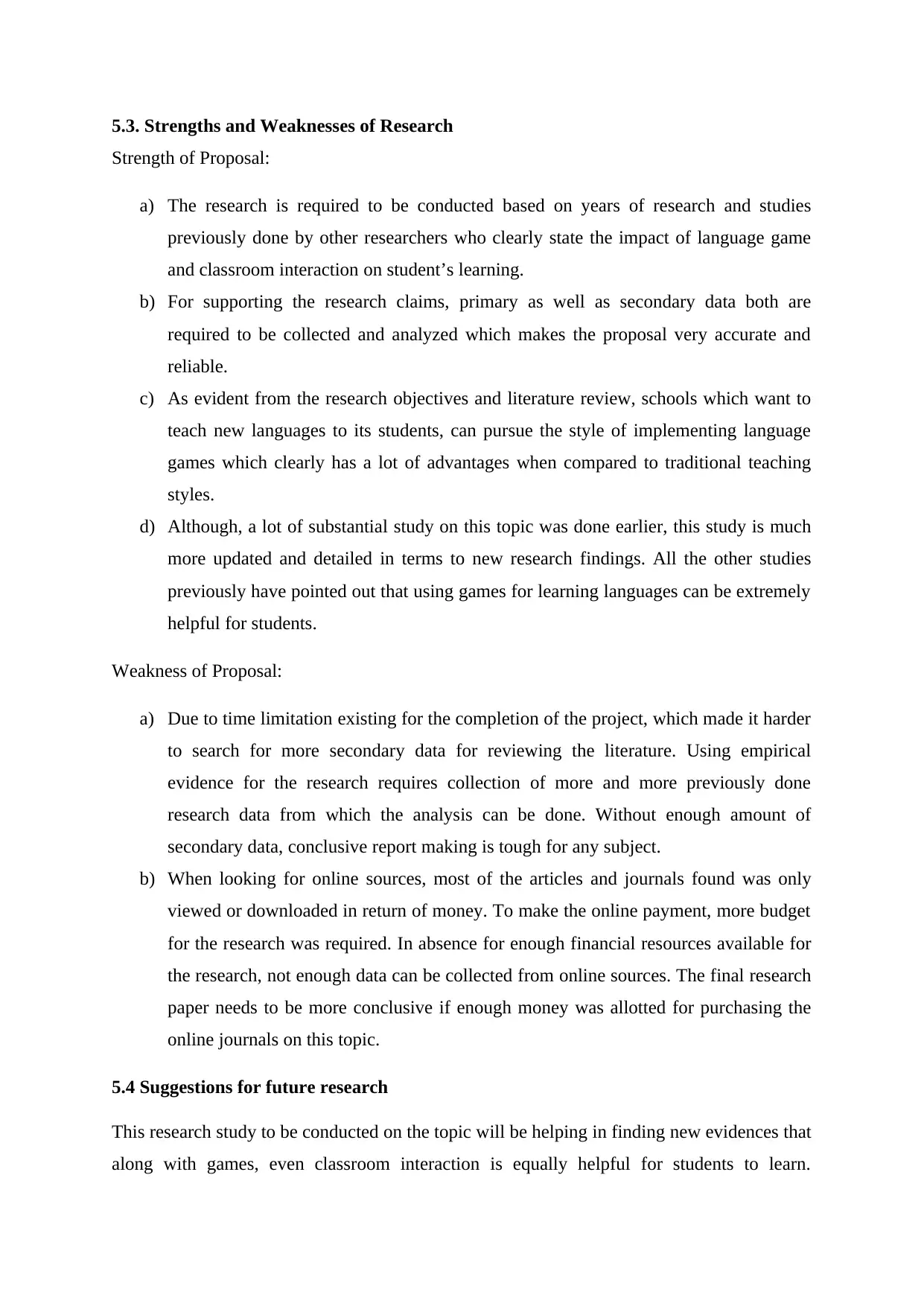
5.3. Strengths and Weaknesses of Research
Strength of Proposal:
a) The research is required to be conducted based on years of research and studies
previously done by other researchers who clearly state the impact of language game
and classroom interaction on student’s learning.
b) For supporting the research claims, primary as well as secondary data both are
required to be collected and analyzed which makes the proposal very accurate and
reliable.
c) As evident from the research objectives and literature review, schools which want to
teach new languages to its students, can pursue the style of implementing language
games which clearly has a lot of advantages when compared to traditional teaching
styles.
d) Although, a lot of substantial study on this topic was done earlier, this study is much
more updated and detailed in terms to new research findings. All the other studies
previously have pointed out that using games for learning languages can be extremely
helpful for students.
Weakness of Proposal:
a) Due to time limitation existing for the completion of the project, which made it harder
to search for more secondary data for reviewing the literature. Using empirical
evidence for the research requires collection of more and more previously done
research data from which the analysis can be done. Without enough amount of
secondary data, conclusive report making is tough for any subject.
b) When looking for online sources, most of the articles and journals found was only
viewed or downloaded in return of money. To make the online payment, more budget
for the research was required. In absence for enough financial resources available for
the research, not enough data can be collected from online sources. The final research
paper needs to be more conclusive if enough money was allotted for purchasing the
online journals on this topic.
5.4 Suggestions for future research
This research study to be conducted on the topic will be helping in finding new evidences that
along with games, even classroom interaction is equally helpful for students to learn.
Strength of Proposal:
a) The research is required to be conducted based on years of research and studies
previously done by other researchers who clearly state the impact of language game
and classroom interaction on student’s learning.
b) For supporting the research claims, primary as well as secondary data both are
required to be collected and analyzed which makes the proposal very accurate and
reliable.
c) As evident from the research objectives and literature review, schools which want to
teach new languages to its students, can pursue the style of implementing language
games which clearly has a lot of advantages when compared to traditional teaching
styles.
d) Although, a lot of substantial study on this topic was done earlier, this study is much
more updated and detailed in terms to new research findings. All the other studies
previously have pointed out that using games for learning languages can be extremely
helpful for students.
Weakness of Proposal:
a) Due to time limitation existing for the completion of the project, which made it harder
to search for more secondary data for reviewing the literature. Using empirical
evidence for the research requires collection of more and more previously done
research data from which the analysis can be done. Without enough amount of
secondary data, conclusive report making is tough for any subject.
b) When looking for online sources, most of the articles and journals found was only
viewed or downloaded in return of money. To make the online payment, more budget
for the research was required. In absence for enough financial resources available for
the research, not enough data can be collected from online sources. The final research
paper needs to be more conclusive if enough money was allotted for purchasing the
online journals on this topic.
5.4 Suggestions for future research
This research study to be conducted on the topic will be helping in finding new evidences that
along with games, even classroom interaction is equally helpful for students to learn.
Paraphrase This Document
Need a fresh take? Get an instant paraphrase of this document with our AI Paraphraser
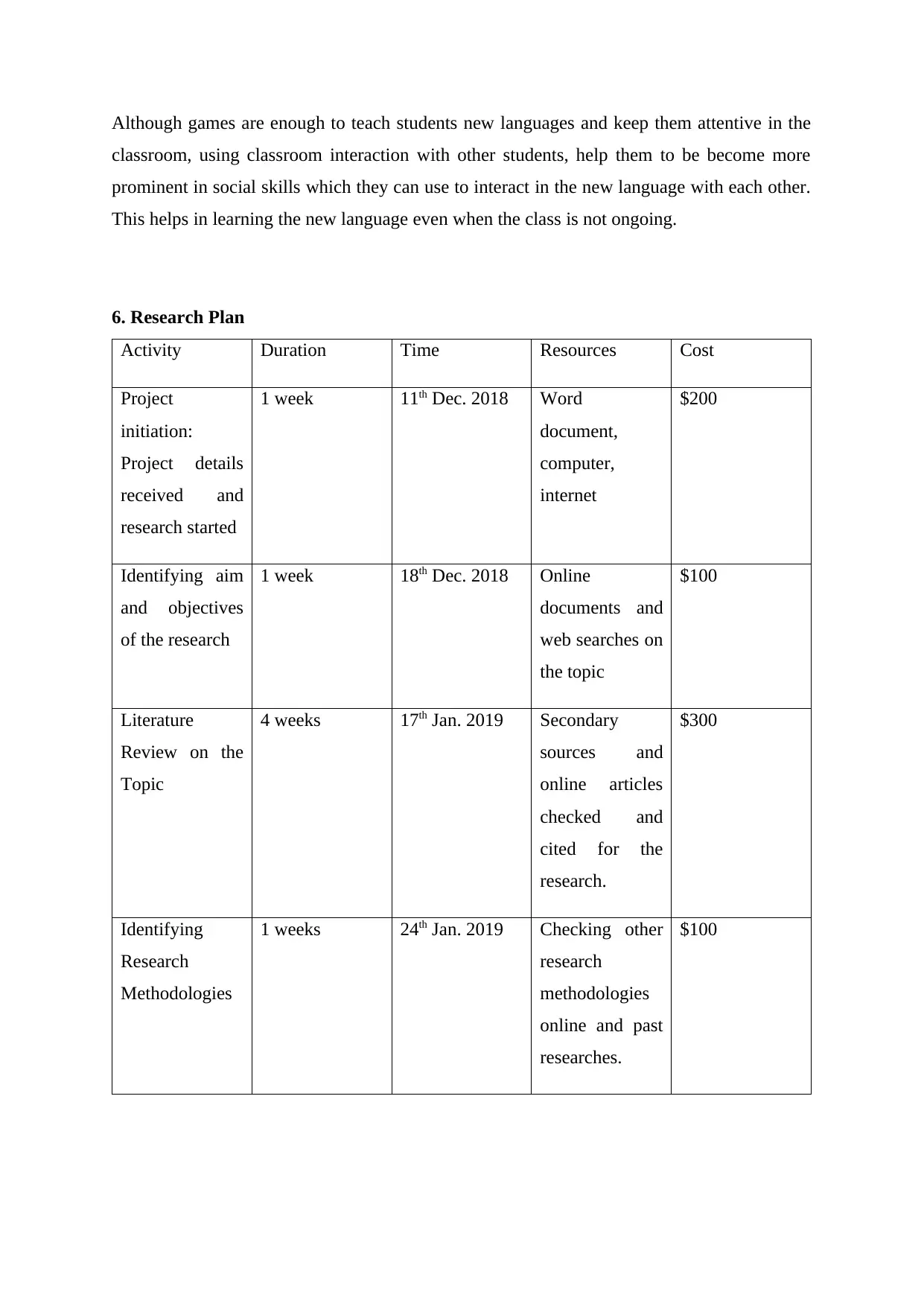
Although games are enough to teach students new languages and keep them attentive in the
classroom, using classroom interaction with other students, help them to be become more
prominent in social skills which they can use to interact in the new language with each other.
This helps in learning the new language even when the class is not ongoing.
6. Research Plan
Activity Duration Time Resources Cost
Project
initiation:
Project details
received and
research started
1 week 11th Dec. 2018 Word
document,
computer,
internet
$200
Identifying aim
and objectives
of the research
1 week 18th Dec. 2018 Online
documents and
web searches on
the topic
$100
Literature
Review on the
Topic
4 weeks 17th Jan. 2019 Secondary
sources and
online articles
checked and
cited for the
research.
$300
Identifying
Research
Methodologies
1 weeks 24th Jan. 2019 Checking other
research
methodologies
online and past
researches.
$100
classroom, using classroom interaction with other students, help them to be become more
prominent in social skills which they can use to interact in the new language with each other.
This helps in learning the new language even when the class is not ongoing.
6. Research Plan
Activity Duration Time Resources Cost
Project
initiation:
Project details
received and
research started
1 week 11th Dec. 2018 Word
document,
computer,
internet
$200
Identifying aim
and objectives
of the research
1 week 18th Dec. 2018 Online
documents and
web searches on
the topic
$100
Literature
Review on the
Topic
4 weeks 17th Jan. 2019 Secondary
sources and
online articles
checked and
cited for the
research.
$300
Identifying
Research
Methodologies
1 weeks 24th Jan. 2019 Checking other
research
methodologies
online and past
researches.
$100
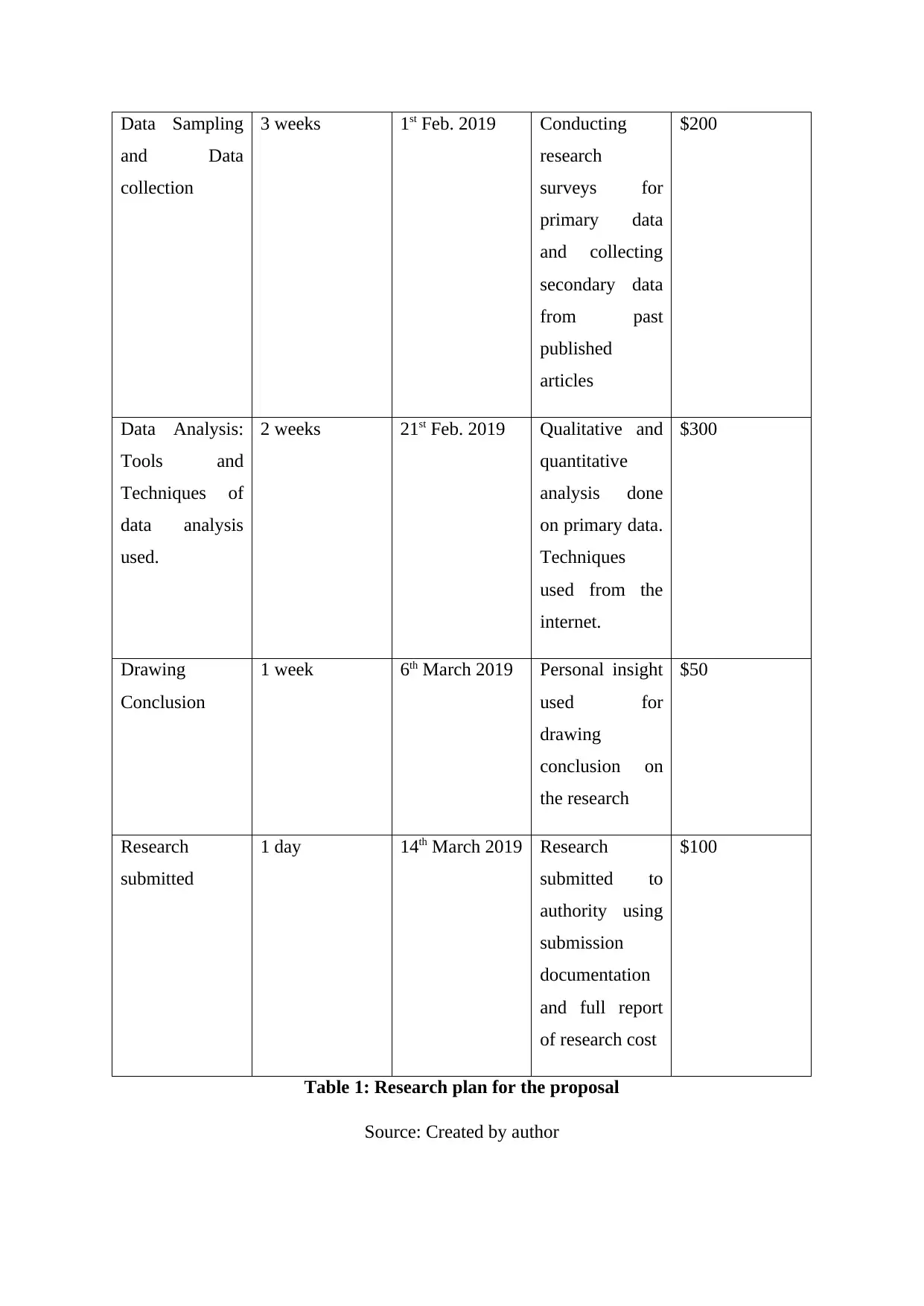
Data Sampling
and Data
collection
3 weeks 1st Feb. 2019 Conducting
research
surveys for
primary data
and collecting
secondary data
from past
published
articles
$200
Data Analysis:
Tools and
Techniques of
data analysis
used.
2 weeks 21st Feb. 2019 Qualitative and
quantitative
analysis done
on primary data.
Techniques
used from the
internet.
$300
Drawing
Conclusion
1 week 6th March 2019 Personal insight
used for
drawing
conclusion on
the research
$50
Research
submitted
1 day 14th March 2019 Research
submitted to
authority using
submission
documentation
and full report
of research cost
$100
Table 1: Research plan for the proposal
Source: Created by author
and Data
collection
3 weeks 1st Feb. 2019 Conducting
research
surveys for
primary data
and collecting
secondary data
from past
published
articles
$200
Data Analysis:
Tools and
Techniques of
data analysis
used.
2 weeks 21st Feb. 2019 Qualitative and
quantitative
analysis done
on primary data.
Techniques
used from the
internet.
$300
Drawing
Conclusion
1 week 6th March 2019 Personal insight
used for
drawing
conclusion on
the research
$50
Research
submitted
1 day 14th March 2019 Research
submitted to
authority using
submission
documentation
and full report
of research cost
$100
Table 1: Research plan for the proposal
Source: Created by author
⊘ This is a preview!⊘
Do you want full access?
Subscribe today to unlock all pages.

Trusted by 1+ million students worldwide
1 out of 14
Related Documents
Your All-in-One AI-Powered Toolkit for Academic Success.
+13062052269
info@desklib.com
Available 24*7 on WhatsApp / Email
![[object Object]](/_next/static/media/star-bottom.7253800d.svg)
Unlock your academic potential
Copyright © 2020–2025 A2Z Services. All Rights Reserved. Developed and managed by ZUCOL.





